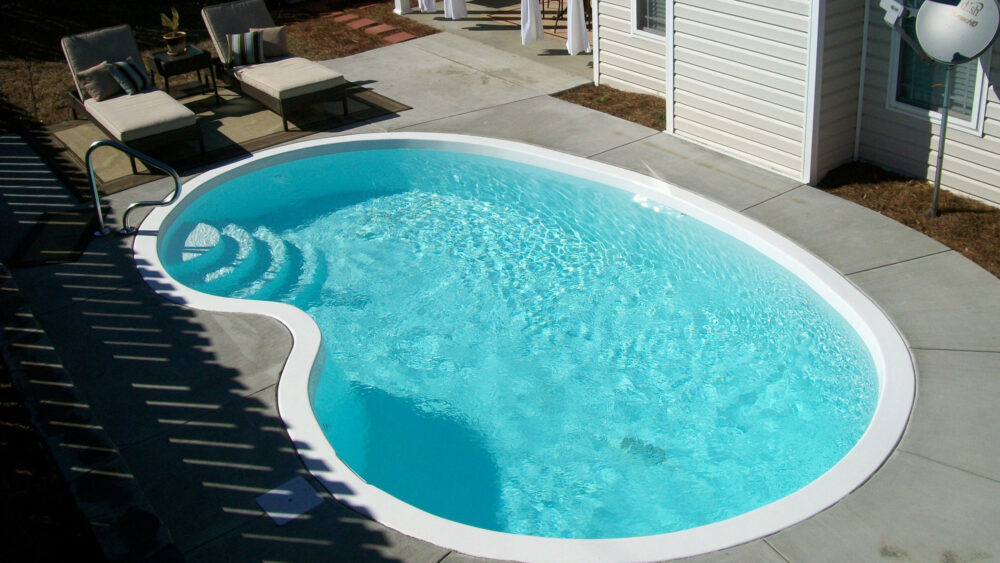Energy Efficiency: How Fiberglass Pools Retain Heat Better
When it comes to owning a swimming pool, many homeowners dream of crystal-clear waters, relaxation, and fun under the sun. However, maintaining a pool can be expensive, and the energy costs associated with heating it can be a significant financial burden. In recent years, there has been a growing trend toward more energy-efficient pool options, and fiberglass pools have emerged as a popular choice for those seeking to save on energy costs while enjoying their pool year-round. In this blog, we’ll explore how fiberglass pools retain heat better and why embracing energy efficiency can benefit both your wallet and the environment.

The Energy Challenge of Traditional Pools
Traditional swimming pools, typically constructed using concrete or vinyl, often face challenges in retaining heat efficiently. The main culprits are poor insulation and heat loss, which occur in several ways:
Inefficient Insulation: Concrete and vinyl pools tend to lack proper insulation. This means that as your pool water heats up, it can quickly lose that heat to the surrounding ground or air.
Evaporation: The surface area of the water is a prime source of heat loss. As water evaporates from your pool, it takes a significant amount of heat with it.
Conduction and Convection: The materials used in traditional pool construction can conduct heat away from the water, and the circulation of cold water can lead to convective heat loss.
Heat Exchanger Loss: If you have a pool heater, traditional pools often experience losses when transferring heat from the heater to the pool water.
All these factors result in the need for constant heating, which can lead to high energy bills and increased environmental impact due to energy consumption.
Fiberglass Pools: A Solution to Heat Loss
Fiberglass pools have gained popularity for various reasons, one of which is their superior ability to retain heat. Here’s why fiberglass pools excel in this regard:
Insulation: Fiberglass pools are constructed with a built-in insulation layer, usually made from high-density foam. This insulation barrier minimizes heat loss to the surrounding ground and air, keeping your pool water warm for longer.
Smooth Surface: The smooth gelcoat surface of fiberglass pools reduces evaporation. Compared to rougher surfaces like concrete, less water evaporates from a fiberglass pool, which means less heat loss.
Low Heat Conductivity: Fiberglass is a poor conductor of heat, which helps keep the warmth where it belongs—inside the pool. This prevents the heat from being transferred to the ground or surrounding structures.
Efficient Heating: Fiberglass pools work well with pool heaters, ensuring that the heat produced is effectively retained in the water. This reduces the need to constantly reheat the pool.
Less Chemical Demand: Fiberglass pools require fewer chemicals to maintain proper water chemistry, which means less energy and cost associated with chemical treatment.
The Benefits of Energy Efficiency
Embracing energy efficiency, particularly with the choice of a fiberglass pool, brings a range of benefits:
Lower Operating Costs: Fiberglass pools can significantly reduce the energy consumption needed to keep your pool warm. This results in lower monthly utility bills, allowing you to enjoy your pool without breaking the bank.
Eco-Friendly: Less energy consumption means a reduced carbon footprint. Energy-efficient choices, such as fiberglass pools, contribute to a more sustainable and environmentally responsible lifestyle.
Extended Swimming Season: With better heat retention, you can enjoy your pool for a more extended period each year. You won’t have to limit your swimming to the hot summer months.
Increased Property Value: Energy-efficient features are often viewed as valuable additions to a property. Installing a fiberglass pool can enhance the overall value of your home.
Enhanced Comfort: You’ll no longer have to endure the shock of cold water when you step into your pool. Fiberglass pools maintain a comfortable water temperature, making your swimming experience more enjoyable.
In the pursuit of an energy-efficient and cost-effective swimming pool, fiberglass pools are a standout choice. Their ability to retain heat efficiently, along with the other advantages they offer, makes them a compelling option for homeowners looking to save on energy costs while enjoying their pool throughout the year. So, if you’re considering a pool installation or renovation, don’t hesitate to contact us at LowCo Gardeners, a certified fiberglass pool installer! Your wallet and the environment will thank you.
